HIT CHANNEL EXCLUSIVE INTERVIEW: August 2014. We had the great honour to talk with a great drummer and a fine person: Simon Phillips. He is best known as drummer of Toto for more than 20 years, but he has also played with Jeff Beck, The Who, Pete Townshend, The Best, Jack Bruce, Judas Priest, Brian Eno, Frank Zappa, Michael Schenker Group, Gary Moore, Whitesnake, Mick Jagger, Eric Clapton, Jimmy Page, David Gilmour, Steve Hackett, Mike Oldfield, Stanley Clarke, Camel, Jon Anderson, Derek Sherinian, PSP and as a solo artist. He recently released his solo album, “Protocol II”. Read below the very interesting things he told us:
 Are you satisfied with the feedback you got from fans and press for your solo album “Protocol II”?
Are you satisfied with the feedback you got from fans and press for your solo album “Protocol II”?
Oh, yeah! I haven’t seen a lot of press as far as I know, but the reviews so far and people’s reaction has been absolutely amazing. They really loved the record.
Can you tell us a few things about the writing and the recording process of “Protocol II” album?
Absolutely, yes! Basically, my idea for this record was to be very loose about it. A little more jam band approach. I had a lot of material which I hadn’t recorded for 11 or 12 years. Some of it, I wasn’t that knocked out with, and some of it was ok, so I presented it to the guys. I said: “Guys, here is a start. That’s how we will do this: If you like some of the music, we use it and then we can come up with new stuff in the sections”. When I sent everybody the material, who are Andy (ed: Timmons –guitar), Steve (ed: Weingard –keyboards) and Ernest (ed: Tibbs –bass), they loved it. And when we started playing it, it made a lot more sense. When you are on your own, in isolation and you do everything alone, it takes some time. Anyway, it went down great. We made a few changes here and there. Some co-writing came in, everybody came up with ideas. Primarily, it was done in 5 days. All the live playing was done in 5 days.
What are your expectations of the upcoming European tour for “Protocol II”?
Well, we are hoping that people will enjoy the band. I mean, the last time we toured, the people loved it. Absolutely loved it. We will be playing a lot of “Protocol II” music.
You played on “My Kind O’ Lovin’” album, written by Dr. Milen Vrabevski. How did it happen to participate in this project along with Toto’s Joseph Williams, and Ex-Uriah Heep/Lucifer’s Friend’s John Lawton?
Oh, this came out of the blue, really! I was contacted by someone in England and Milen wanted to do a record and we talked a little bit and basically came to L.A. I have a studio there that I have been set up and when I am there I can arrange and mix things. So, he came in and we recorded his music.
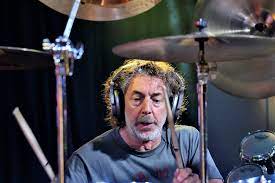 Are you currently involved in other projects?
Are you currently involved in other projects?
Oh, yes. I am always involved in a lot of other projects. Right now, I am in the middle of mixing a record. The artist is Billie Rainbird and the album is gonna be fantastic. I ‘ve done the seven mixes and I have to do a very quick trip and I will come back and I will finish the record. There are a lot of musicians on the album.
Do you like today your first solo album, “Protocol” (1988)?
Oh, absolutely. It was recorded 25 years ago. It’s funny a lot of people love that record and it was at the time very experimental. The thing with that record was: I’m not a singer, so there is no point writing vocal songs, I’m not a lyricist. So, what I do is writing instrumental music. If I am writing vocal music, I am co-writing with another writer, these guys all can write lyrics. So, I wanted to do something totally on my own. At the time, I had a few demos and I was trying to get a record deal but it was very difficult. It is always difficult to that kind of music. I had a studio and I said: “You know what? I’m just gonna do this myself”. And I didn’t have a budget, even though I had a studio but I didn’t afford to pay for the musicians, so I decided to do it myself. And when I played all the instruments myself, it came out in a very different way. It was kind of pop fusion record if you know what I mean and I lot of people still love that record. It’s interesting, we still play a couple of the music from it. This time with real musicians, not just me playing with useful synthesizers. But at the time, it was fine. That was what I call it experimentation but it was me replacing all the people (laughs). It was very experimental.
You spend a lot of time mixing and mastering tracks at your Phantom Recordings studio. Do you enjoy being behind the recording console?
Oh, very much. I ‘ve been doing this professionally since 1983, when I was working with Mike Oldfield on an album called “Crises” . He asked me to co-produce the record with him. And I had an engineer that I worked with and he quietly fired him after day one and decided I should become an engineer (laughs). So, I blame Mike for all this, but it was something I wanted anyway and I just needed the opportunity to do it. And Mike Oldfield taught me a lot about recording. So, I owe a lot to Mike because he gave me my basic training as an engineer.
How important is improvisation for you?
Extremely important. Improvisation is the basis of how I play every single type of music. Just because music is rock ’n’ roll or reggae, it doesn’t mean it has to be without improvisation. The whole nature of being a drummer is to have to improvise. Even it is coming up as part of a song or in the middle of the song and you are reacting to what the singer is phrasing, have a phrasing or singing, this is how I play. Improvising is part of my whole life.
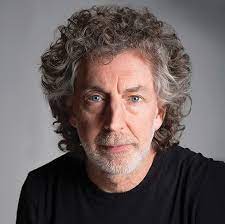 Do you feel lucky that recognition came very early in your career? Other musicians struggle a whole life to become recognized!
Do you feel lucky that recognition came very early in your career? Other musicians struggle a whole life to become recognized!
That’s true. I am grateful and very fortunate to have been recognized early on, but primarily I wasn’t thinking about it. Early on, I just wanted to be a great player and I still want to be a great player. I used to listen to all these great old musicians. Early on in my career, I was very young when I was started recording. It is a very unusual career because I think it goes back to my experience of playing with my father’s band when I was 12 years old until 16. I learned to take musical discipline and I learned it very-very early on. I also learned to read very early on. But more important than that, was the musical discipline and that allowed me to be able to play in studios and play on recordings. And as soon as I started when I was 16 years old, people realised: “Wow! He is in the studio, reads music, plays in time, but also knows how to play in the studio”. That’s important. I grew up in a studio. I was 4 or 5 years old when I used to go to the studio to look my dad playing percussions. I was very lucky to have that discipline and I think that’s why I was really able to do sessions when I was 17, 18 or 19. I didn’t really think much about the recognition because when you play in a studio, you don’t have an audience. People heard me on their own records. They said: “Who’s that drummer?” and that’s how I came about. I didn’t really start to think about all this, until a bit later and then I was a little bit more spasmodic. So, I don’t really think about the recognition part of it. I just want to play well.
You were one of the drummers, the only time the three former Yardbirds guitarists (Eric Clapton, Jeff Beck and Jimmy Page) played together during the A.R.M.S concerts (benefit for Ronnie Lane, bassist for Faces and Small Faces). How was that experience?
(Laughs) It was a lot of fun. It was pretty amazing to see these icons coming on stage and play other people’s music. That always is amazing. I still remember to this day when I was with Jimmy and we were playing a song called (ed: pause, he’s thinking) “Stairway to Heaven” (laughs), a quite famous song, and halfway through “Stairway to Heaven”, the idea was Eric and Jeff would come on and start playing. I believe Eric was playing acoustic and Jeff was playing electric. And I remember them coming on and Jimmy was soloing and both Eric and Jeff looked at me going: “Where are we? What are you going to do it?” Their facial look was hilarious. But it was really cool just to be there and playing together with all these three guys. It was pretty amazing.
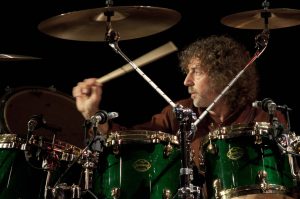 There is an amazing performance by you on Youtube on Pete Townshend’s (The Who) “Give Blood” featuring David Gilmour (Pink Floyd)! Do you remember that evening? It seems that you had a great time then!
There is an amazing performance by you on Youtube on Pete Townshend’s (The Who) “Give Blood” featuring David Gilmour (Pink Floyd)! Do you remember that evening? It seems that you had a great time then!
There are a couple of videos that he plays. There is one from Brixton Academy and there is one on Youtube on a TV show Rockpalast at MIDEM Cannes in France. That was a lot of fun, yes. It was really fun to play with David and Pete. I dig that, really.
There were many musicians on stage.
Yeah. It was a big band. We had backing brass section, three singers, percussion. Wow! I really liked playing the song “Give Blood”. It was pretty amazing. There was a lot of fun.
I know that Jeff Beck is a perfectionist. What was the most important thing you learned during the period you played with Jeff Beck?
Jeff is an enigma. Back then, he didn’t like to go out on tour very much. And when he did, he really played like about two weeks. Three weeks was just too long for him. He said: “I don’t want to run out of ideas”. I think what I learned from him was grabbing the moment. Making impression at even though it maybe seems as negative to say: “Don’t bother”. It was his attitude back then. He has changed. He is enjoying life a lot more and he is playing a lot more. But in a way, I guess what it was -I translated that and it doesn’t mean that it is a negative thing, I put it positively in thinking that- always try to come up to something, always try to go out on stage and feel like it is the first time you play. And that is how I do it. I always look for a new way of playing a song. Even when you play a song over and over again like “Rosanna”, “Hold the Line”, all those songs. I always try to find a new spin on it. People may not recognize it because it has to be very subtle, you just can’t change the groove because this is what you think, but very subtly is that you can change. Just keep it sounding fresh. I think you always feel that. That’s why I really appreciate what Jeff does during his shows.
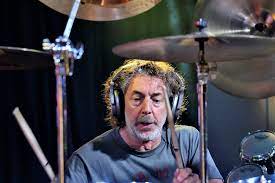 You played drums on Judas Priest’s “Sin After Sin” album. Did you feel comfortable playing that heavy metal stuff?
You played drums on Judas Priest’s “Sin After Sin” album. Did you feel comfortable playing that heavy metal stuff?
Oh, totally. Around that time I did a lot of heavy metal. Back then, we were breaking ground. We didn’t really know. I just had a basic way I played the music. Nowadays, all these guys from bands like Megadeth, Rob Zombie, all those guys, grew up with those records. That’s the amazing thing. And even though you listen to them now, they don’t sound that heavy because the recording process was so different. All those drummers I hang out with, Jason Bittner (Shadows Fall), John Tempesta (The Cult, Exodus, Testament), it’s amazing that they always talk about those records: “When I was young, I was listening and growing up to those records”. I am like: “Wow! Ok”. But I loved playing that music. I played with Michael Schenker in Japan about 4 years ago. And I had such a ball! It was really fun.
You recorded with Frank Zappa on his “Leatherette” album (1978). How was Frank Zappa like as a person and as a collaborator?
Frank was a very interesting person. I am a huge Frank Zappa fan, before I worked with him. When I worked with him, I said: “Ok, that’s interesting”. It was certainly an experience. As a fan now, I hear all his stuff and his ideas. He was a total workaholic. That guy never stopped. Never stopped. He drank coffee like it was water and always was looking for something. But it was an interesting process. I wouldn’t say that it was a process I completely enjoyed but I observed and learned a lot. Especially about recording really difficult pieces. He was producing an artist called L. Shankar, an Indian violinist who was playing in his band at the time. He played in the band Shakti with John McLaughlin. And he played with Zappa, Peter Gabriel and in fact, I worked with him very recently on this new album I am producing for Billie Rainbird. He is out there and doing a lot but his music is very intriguing. And Frank produced that beautifully and I learned a lot from the way he did it. It took us two days to get these things together but by the time you hear it now it sounds like as smooth as silk. It’s great.
Did you feel a lot of pressure from Camel’s label when you recorded “The Single Factor” (1982) at Abbey Road Studios?
Oh, Camel!! Not, at all! Not, at all!
Because I have read that the label wanted a single, that’s why Latimer called the album “The Single Factor”.
Oh, I didn’t know anything about that. I was just called to play on the record. I had a great time. I remember the sessions very well, actually. We were at Abbey Road 3 and there was a lot of fun. Ant Phillips (ed: guitarist and founding member of Genesis) was with them. He played on the Mike Rutherford album (ed: “Smallcreep’s Day”-1980). He was in Genesis many years ago. That was a lot of fun. I remember that now. I had a different tuning on those sessions maybe because the engineer liked a certain way, so I had to work with him on that. That’s cool too. We loved it. We had a lot of fun.
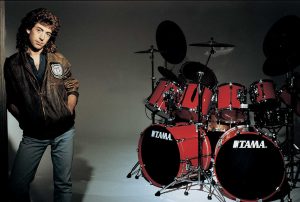 Do you wish The Best supergroup [Keith Emerson (ELP, The Nice), John Entwistle (The Who bassist), Joe Walsh (The Eagles guitarist) and Jeff “Skunk” Baxter (Steely Dan guitarist)] had lasted longer?
Do you wish The Best supergroup [Keith Emerson (ELP, The Nice), John Entwistle (The Who bassist), Joe Walsh (The Eagles guitarist) and Jeff “Skunk” Baxter (Steely Dan guitarist)] had lasted longer?
Frankly, it was a band we put together for a trip to Japan and Hawaii. It was a lot of fun but I don’t really see that the band could have much more future. It was just a funny thing. We got together and played everybody else’s music and that was great. It was lovely. There were a lot of projects like that. We just got together and because of it, there was a lot of fun. There was no pressure. That was the good thing about it. But as soon as you see something as a serious project, then there is more pressure and not much fun. I think it was fine. For what it was, it was great. I got to play with Keith Emerson, that was wonderful. And Joe, it was great to hang with him. And obviously The Ox, John Entwistle with whom I played in The Who. Jeff Baxter… That was great.
Was it an easy decision for you to join Toto after the death of Jeff Porcaro?
No, I was surprised. I was very surprised to be asked. But once I went over there and I spent time with the band, I asked them why they took that decision and why they asked me. But after that the question was: “Do you want to continue with the band and join us?” So, in 1993 I did and I stayed with them for 21 years. When it started out really, I thought I would just play for one tour and that was it, but frankly it was a job that it had to be done. I was into it and I tried the best I could and it went very well. It was very sad at the time of course, but life goes on. And I did it for 21 years.
Have you ever turned down an interesting work offer because you were busy or for any other reason?
Oh, there have been a few of those. I think one of the last ones of those was Herbie Hancock. He asked me to do a tour, but I could only do a part of it, because I was already contracted to do some other work. I had something else to do and I didn’t do that. I hope I will be able to do that one day.
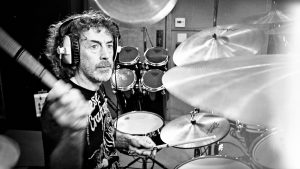 Who is the most talented person you’ve seen in your life?
Who is the most talented person you’ve seen in your life?
There are so many people and that’s really hard to answer it. There are so many. I have been very lucky to work with incredible talents. They all are: Peter Gabriel, Pete Townshend, Mike Oldfield. They are all amazing. It’s very difficult to pick one person. I was very lucky to play with amazing musicians and great artists.
Do you remember the show you played with Toto in Athens, Greece in 2005?
Yes, I remember it very well, absolutely. That was my one and only visit to Greece. I would love to come back.
A huge “THANK YOU” to Mr Simon Phillips for his time.
Photographs: Billie Rainbird
Official Simon Phillips website: http://www.simon-phillips.com
Official Protocol II website: http://protocol-2.com
Official Simon Phillips Facebook page: http://www.facebook.com/SimonPhillipsOfficialBandPage
Buy “Protocol II” on CD Baby here: http://www.cdbaby.com/cd/simonphillips22

